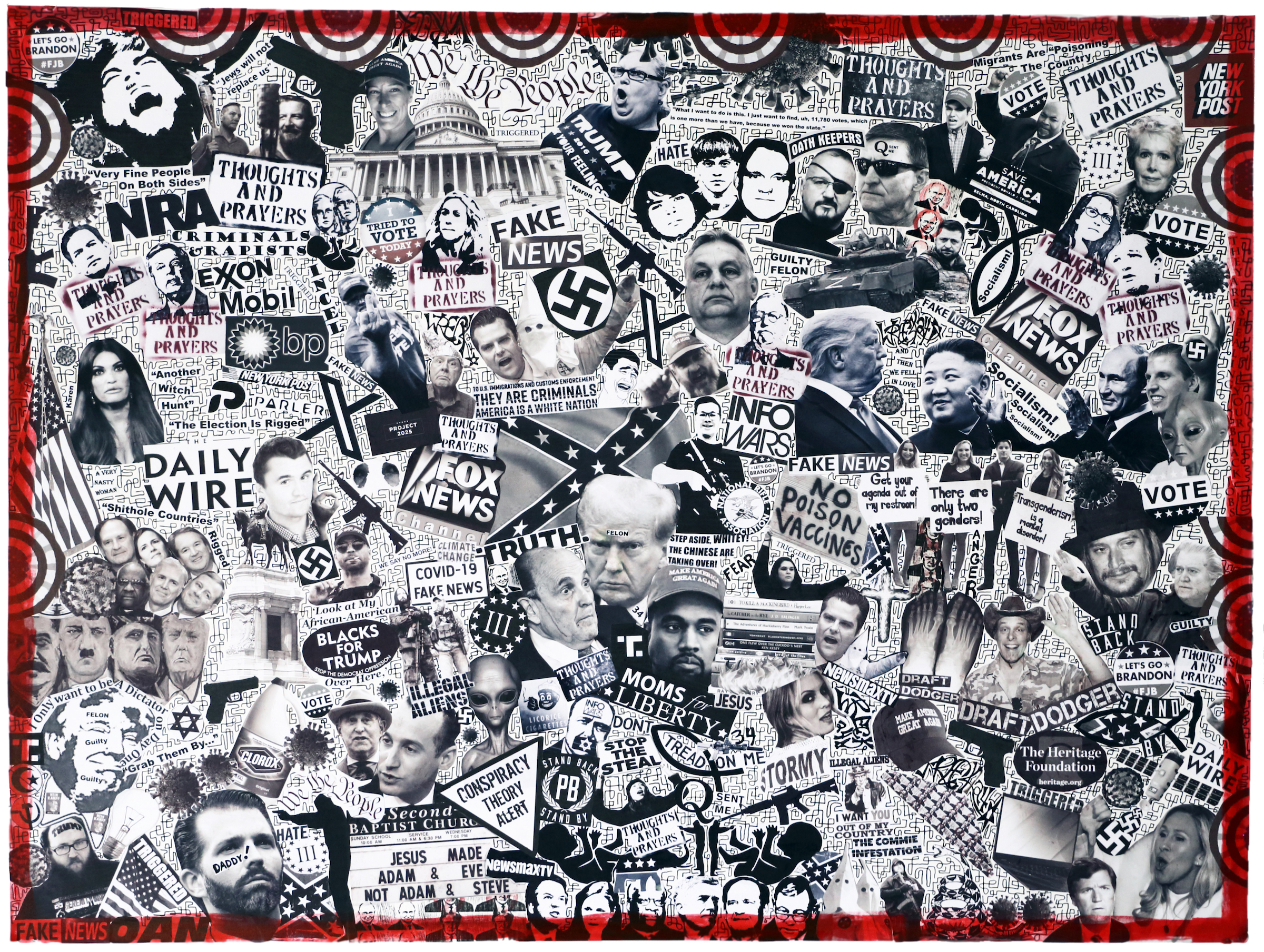After Republican backlash, visitors to East Tennessee State University’s (ETSU) Reece Museum are being asked to sign a liability waiver before entering an exhibition displaying works that challenge conservative dogma.
Located in Johnson City, the Reece Museum has presented The FL3TCH3R Exhibit for the last 11 years. The annual show focused on “politically and socially engaged art” was created by the family of Fletcher Dyer, who was an art student at the university when he was killed in a motorcycle accident in 2009. The latest iteration of the exhibition opened in October with a juried selection of over 60 works, and anyone could see it without restrictions until late November, after the right-wing media outlet Campus Reform published images of some of the art.
Republicans focused their criticism on three artworks published in the article: Joel Gibbs’s “Evolution” (2024), depicting House of Representatives Speaker Mike Johnson in front of swastikas that morph into the Christian cross; Devin Long’s “Patriot” (2024), consisting of a Ku Klux Klan hood made from an American flag; and Joe Quinn’s “It’s All Connected” (2024), a collage that reproduces violent messaging from alt-right figures. All three artists told Hyperallergic that their pieces are meant to critique the hateful symbols they reference. Long explained that the KKK reference in “Patriot” emerged from “the fact that the United States almost exclusively targets Black and Brown people abroad, as it has done historically within its own borders.”
Republican lawmakers such as Tennessee State Senator Rusty Crowe, meanwhile, called the works “hateful” and accused them of making fun of Christianity. Last month, US Representative Tim Burchett wrote a letter to ETSU Dean Joseph Bidwell demanding that the exhibition “be taken down immediately,” and US Representative Diana Harshbarger said that the art made a “mockery” of her Christian faith.
Rejecting the characterization of his work “Evolution” as anti-Christian, Gibbs told Hyperallergic in an interview that the piece is a commentary on politicians “twisting Christianity to authoritarian ends.”
“I thought … this piece might be sort of a canary in a coal mine about the reaction to liberalism on university campuses,” Gibbs said, referencing Trump’s vow to end “wokeness” in American schools.
University President Brian Noland initially told WJHL he would uphold state and federal laws despite pressure from Republican lawmakers to take the show down. However, Hyperallergic confirmed with members of the Dyer family that the Reece Museum was closed the entire week of Thanksgiving, though it only publicized a Wednesday to Sunday closure. When Hyperallergic called the Reece Museum for comment Monday morning, December 2, a receptionist said that the exhibition was open again, but that visitors were being asked to “sign a waiver” and that curtains were installed alongside “content warnings” written by the university.
Fletcher’s parents, Barb Dyer and M. Wayne Dyer, and sister, Carrie Dyer, told Hyperallergic that while the show is set to end this Friday, December 6, they believe it was “essentially censored” when the museum closed to the community last week.
A spokesperson for East Tennessee State University told Hyperallergic that the museum was closed last Monday and Tuesday because it “did not have adequate staff to ensure the exhibit could open safely in light of the controversy some of the works on display have caused” during the holiday week. The spokesperson confirmed that visitors must sign a waiver and that curtains were added to the exhibition, but declined to comment further.
In a copy of the waiver provided to Hyperallergic by the Dyer family, visitors of the exhibition are asked to “forever discharge” the university and its affiliates from “any and all claims or liability” caused by viewing The FL3TCH3R Exhibit, including injury and property damage. A content warning, also shared with Hyperallergic, states, “Some works in the exhibit may be construed as hate speech.”
The National Coalition Against Censorship (NCAC) initially backed Noland’s commitment to uphold the First Amendment, but Elizabeth Larison, the director of the organization’s arts and culture unit, told Hyperallergic that they are reviewing their stance on the museum’s waivers and signage. ETSU has not yet responded to several requests for comment.

The Dyer family disapproves of the new measures, which they told Hyperallergic could “deter engagement” with the artworks.
“By suggesting that some works may be construed as hate speech and requiring visitors to sign a waiver, the sign not only misrepresents the purpose of the exhibit but also undermines the intent of the artists and the curatorial process,” Barb Dyer wrote in an email.
Carrie Dyer said on Facebook that the family “advocated for different conditions” but was ultimately “forced” to implement the changes to keep the exhibit open.
Barb Dyer added that the exhibition is based on her late son’s “passion to encourage people to develop their sense of self and sense of community by creating a personal point of view, whatever that might be.”

Quinn, one of the artists whose work is restricted from view, told Hyperallergic that lawmakers’ efforts to shut down the show constitute “an attack on free speech.”
“My work is merely a reflection of the alt-right and its intolerance, and showing the throughlines between the media, politicians, and dangerous rhetoric that has taken hold in our country,” Quinn continued.
The Dyer family emphasized that The FL3TCH3R Exhibit’s guiding philosophy aligns with a statement that Fletcher wrote in high school: “I dream of making a difference in some way with my art, I might attempt to right political, social, and religious wrongs by showing society a glimpse of how I feel about serious issues in the world.”

